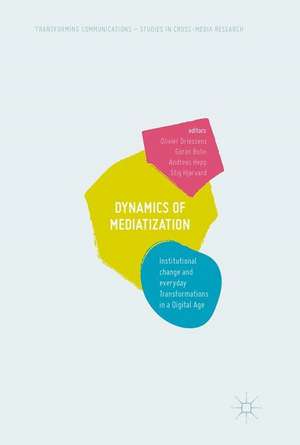Dynamics Of Mediatization: Institutional Change and Everyday Transformations in a Digital Age: Transforming Communications – Studies in Cross-Media Research
Editat de Olivier Driessens, Göran Bolin, Andreas Hepp, Stig Hjarvarden Limba Engleză Hardback – 7 dec 2017
This volume sheds light on the underlying dynamics of mediatization, disentangling the actual unfolding of mediatization processes. The wide adoption and deep embedding of digital media and technology brings new questions to mediatization studies: how can we grasp this ‘deep mediatization’? In which way should we develop existing approaches of mediatization to analyse such dynamics? What are the consequences of this for theorising and empirically studying mediatization? By using these questions as a starting point, this book presents an innovative and original collection that is dedicated to both the underlying dynamics of mediatization and recent dynamics related to digital media.
| Toate formatele și edițiile | Preț | Express |
|---|---|---|
| Paperback (1) | 529.48 lei 38-44 zile | |
| Springer International Publishing – 31 aug 2018 | 529.48 lei 38-44 zile | |
| Hardback (1) | 786.84 lei 6-8 săpt. | |
| Springer International Publishing – 7 dec 2017 | 786.84 lei 6-8 săpt. |
Preț: 786.84 lei
Preț vechi: 959.56 lei
-18% Nou
Puncte Express: 1180
Preț estimativ în valută:
150.56€ • 157.62$ • 124.58£
150.56€ • 157.62$ • 124.58£
Carte tipărită la comandă
Livrare economică 05-19 aprilie
Preluare comenzi: 021 569.72.76
Specificații
ISBN-13: 9783319629827
ISBN-10: 3319629824
Pagini: 338
Ilustrații: XIX, 338 p. 15 illus.
Dimensiuni: 148 x 210 mm
Greutate: 0.58 kg
Ediția:1st ed. 2017
Editura: Springer International Publishing
Colecția Palgrave Macmillan
Seria Transforming Communications – Studies in Cross-Media Research
Locul publicării:Cham, Switzerland
ISBN-10: 3319629824
Pagini: 338
Ilustrații: XIX, 338 p. 15 illus.
Dimensiuni: 148 x 210 mm
Greutate: 0.58 kg
Ediția:1st ed. 2017
Editura: Springer International Publishing
Colecția Palgrave Macmillan
Seria Transforming Communications – Studies in Cross-Media Research
Locul publicării:Cham, Switzerland
Cuprins
1. Introduction: Situating dynamics of mediatization; Olivier Driessens & Stig Hjarvard.- Part I. Rethinking the Dynamics of Mediatisation.- 2. The identity of mediatization: Theorizing a dynamic field; Marian Adolf.- 3. Mediatization from below; Magnus Andersson.- 4. Mediatization: From structure to agency (and back again); Zrinjka Peruško.- 5. Towards the ‘audiencization’ of mediatization research? Audience dynamics as co-constitutive of mediatization processes; Kim Christian Schrøder.- Part II. Dynamics in Politics and Organisations.- 6. The localities of mediatization. How organizations translate the ideas of media into everyday practices; Magnus Fredriksson & Josef Pallas.- 7. Is there any future for research on the mediatization of politics?; ^osses or heightened control? On the limits of the idea of media autonomy in the mediatization of politics narrative; Ximena Orchard.- Part III. Dynamics in Everyday Life and Culture.- 10. Mediatization of the automobile; James Miller.- 11. The mediatization of fashion: The case of fashion blogs; Nete Nørgaard Kristensen & Christa Lykke Christensen.- 12. Musicalization and mediatization; Tobias Pontara & Ulrik Volgsten.- 13. The legacy of mediatization: When media became cultural heritage; Christian Hviid Mortensen.- 14. The mediatization of urban cultural heritage: facilitating participatory approaches to narrating the urban past; Arno van der Hoeven.- 15. Conclusion: Future perspectives of mediatization research; Göran Bolin & Andreas Hepp.
Notă biografică
Olivier Driessens is Lecturer in the Sociology of Media and Culture, Department of Sociology, University of Cambridge, UK.
Göran Bolin is Professor of Media and Communication Studies at Södertörn University, Sweden.
Andreas Hepp is Professor of Media and Communication studies at the Faculty for Cultural Studies at the University of Bremen, ZeMKI, Germany.
Stig Hjarvard is Professor in the Department of Media, Cognition and Communication at the University of Copenhagen, Denmark.
Göran Bolin is Professor of Media and Communication Studies at Södertörn University, Sweden.
Andreas Hepp is Professor of Media and Communication studies at the Faculty for Cultural Studies at the University of Bremen, ZeMKI, Germany.
Stig Hjarvard is Professor in the Department of Media, Cognition and Communication at the University of Copenhagen, Denmark.
Caracteristici
The outcome of the discussions in the Mediatization Section of the European Communications Research and Education Association (ECREA) Aims to give the field of mediatization research a new direction and push Focusses on the underlying dynamics of mediatization





